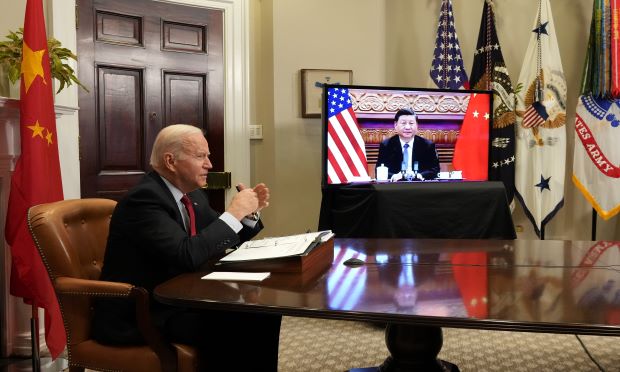Biden and Xi pledge more cooperation but offer no breakthroughs

WASHINGTON – President Joe Biden and China’s leader, Xi Jinping, pledged at a virtual summit to improve cooperation but offered no concrete action after 3 1/2 hours of talks.
In separate statements after the talks ended Monday (15) evening, each side emphasized the points of contention that mattered most: lists of mutual grievances that underscored the depth of the divisions between them.
Biden, the White House said, raised concerns about human rights abuses and China’s “unfair trade and economic policies”. Xi said that US support for Taiwan was “playing with fire” and warned that dividing the world into alliances or blocs — a pillar of the new administration’s strategy for challenging China by teaming up with its neighbours — would “inevitably bring disaster to the world”.
In advance of the meeting, White House officials had signalled that there would be no concrete agreements or initiatives, or even an effort to put out a joint statement — usually a pre-negotiated statement on areas of agreement or projects to tackle together.
The two leaders nevertheless expressed a willingness to manage their differences in a way that avoided conflict between the world’s two largest powers. That alone could lower the temperature of a relationship that has at times this year threatened to overheat.
“It seems to me we need to establish some common-sense guardrails,” Biden said, using a phrase his administration has often cited as a goal for a challenging relationship. Addressing Xi directly, he added: “We have a responsibility to the world, as well as to our people.”
Although the two leaders have spoken by telephone twice this year, the conference was intended to replicate the more thorough discussion of issues of previous summits between the United States and China — something that was not possible because health and political concerns have kept Xi from traveling since January 2020.
Both men were accompanied by a phalanx of senior aides — the Americans in the Roosevelt Room at the White House and the Chinese inside a chamber in the Great Hall of the People in Beijing. In brief remarks at the beginning of the meeting, each struck a conciliatory tone, flagging areas of disagreement but also pledging to work together.
Biden, seated before two large screens, noted that the two have “spent an awful lot of time talking to each other” over the years, dating to when Biden was vice president and Xi was a rising power in the Chinese leadership. Xi said he was prepared to move relations “in a positive direction.”
“Although it’s not as good as a face-to-face meeting, I’m very happy to see my old friend,” Xi said.
Biden emphasized the need to keep “communication lines open,” according to a White House statement, as the two countries confront disagreements over issues like the future of Taiwan, the militarization of the South China Sea and China’s exploitation of vulnerabilities to bore deeply into the computer networks of US companies, especially defence contractors.
The call, which was initiated at Biden’s request, reflected his administration’s deep concern that the chances of keeping conflict at bay may be diminishing. Biden has repeatedly suggested that it should be possible to avoid active military engagement with China, even as the United States engages in vigorous competition with Beijing and continues to confront the Chinese leadership on several significant issues.
The statements hinted at some discussion of “strategic” issues, a phrase that appeared to encompass the nuclear strategies of both nations, but US officials declined to detail those discussions. Some issues that had been the source of speculation before the summit did not come up, including disputes over visas and an invitation to attend the Winter Olympics in Beijing, which begin in February.
-New York Times

